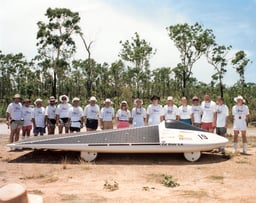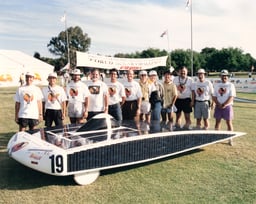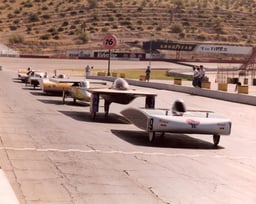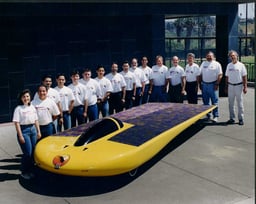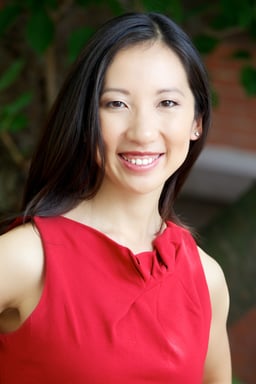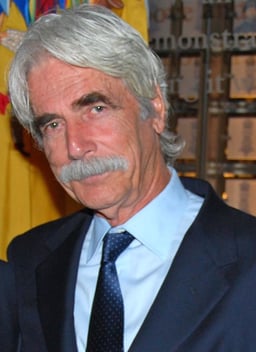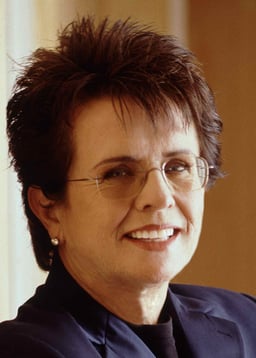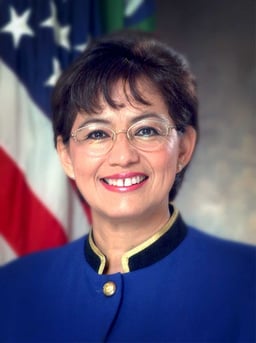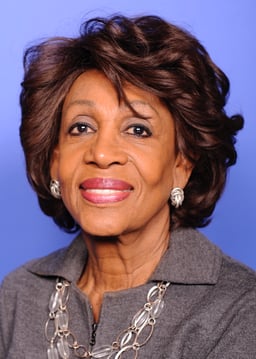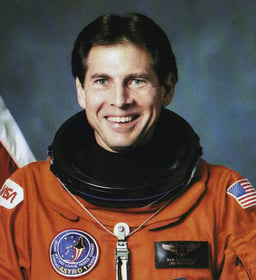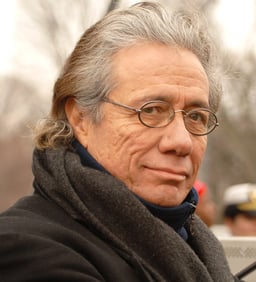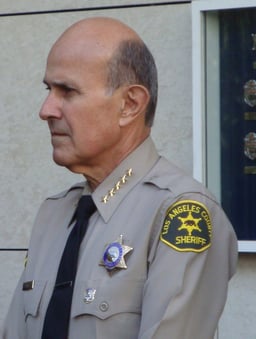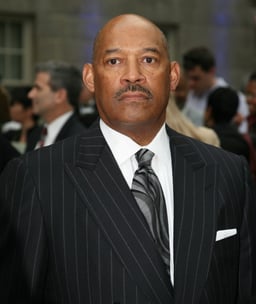California State University, Los Angeles
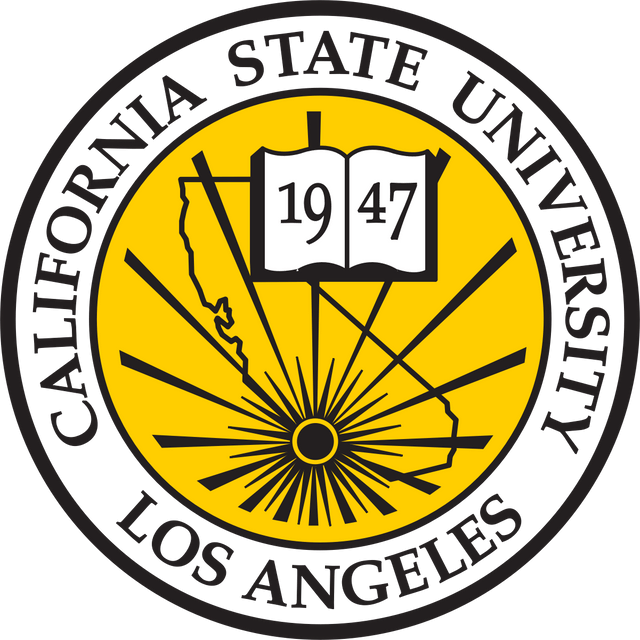
California State University, Los Angeles

Former names | Los Angeles State College of Applied Arts and Sciences (1947–64) California State College at Los Angeles (1964–72) |
|---|---|
| Motto | Vox Veritas Vita (Latin) |
Motto in English | "Voice Truth Life" – Speak the truth as a way of life. |
| Type | Public land-grant |
| Established | 1947[1] |
| Endowment | $40.1 million (2018)[2] |
| President | William A. Covino[3][4] |
| Provost | Lynn Mahoney[5] |
Academic staff | 1,031 |
| Students | 27,686 (fall 2018)[6] |
| Undergraduates | 24,002 (fall 2018)[6] |
| Postgraduates | 3,683 (fall 2018)[6] |
| Location | University Hills, Los Angeles ,California ,United States |
| Campus | Urban, 175 acres (71 ha) |
| Colors | Black & Gold |
| Athletics | NCAA Division II – CCAA |
| Nickname | Golden Eagles |
| Affiliations | California State University system Western Association of Schools and Colleges |
| Mascot | Eddie the Golden Eagle |
| Website | www.calstatela.edu [119] |
| University rankings | |
| National | |
| Forbes[64] | 499 |
| Times/WSJ[65] | 501-600 |
| Regional | |
| U.S. News & World Report[66] | 31 |
| Master's University class | |
| Washington Monthly[67] | 8 |
USNWR Best Regional Colleges West Rankings [68] | |
| Top Public Schools | 12 |
| Best Value Schools | 11 |
| Top Performers on Social Mobility | 11 |
| Best Colleges for Veterans | 18 |
| Best Undergraduate Engineering Programs | 32 |

Cal State LA is located about 5 miles (8 km) northeast of Downtown Los Angeles.[13]
California State University, Los Angeles (Cal State LA) is a public university in Los Angeles, California. It is part of the 23-campus California State University (CSU) system. Cal State LA offers 129 bachelor's degrees, 112 master's degrees, and four doctoral degrees: a Doctor of Philosophy (Ph.D) in special education in collaboration with the University of California, Los Angeles (UCLA), a Doctor of Education (Ed.D) in Educational Leadership, a Doctor of Nursing Practice (DNP) and a Doctor of Audiology (AuD). It also offers 22 teaching credentials.[7][8]
In Fall 2018 Cal State LA was the 5th most applied-to CSU campus for incoming freshmen and had the 5th lowest admit rate.[9] Cal State LA has a student body of 27,685 as of fall 2018 with undergraduates numbering 24,002 primarily from the greater Los Angeles area,[6] as well as 245,000 alumni. Cal State LA operates on the semester system with two semesters, each 15 weeks in duration per year: in the fall of 2016, the university changed to the semester system as part of a system-wide conversion of all quarter campuses.[10] Cal State LA is organized into eight colleges that house a total of four schools and approximately 50 academic departments, divisions and interdisciplinary programs offering a variety of majors.[11] The Early Entrance Program (EEP) in the Honors College for gifted students as young as 11 is the only one of its kind in the United States in promoting a direct transitional scheme from middle and high school to college without intermediary remedial education.[12] Cal State LA is a Hispanic-serving institution.
The 175-acre (71 ha) hilltop campus core is home to the nation's first Charter College of Education, a NASA-funded SPACE program, Rockefeller-supported humanities center, and a National Science Foundation-funded environmental research center. Cal State LA is home the critically acclaimed Luckman Jazz-Orchestra.
It is also home to two high schools the Marc and Eva Stern Math and Science School and the Los Angeles County High School for the Arts (LACHSA), a prestigious arts high school, notable for being the only arts high school in Los Angeles that allows for students from any district within Los Angeles County to attend. Classrooms are shared with Cal State LA, however, LACHSA activities tend to be separate from those of the university. Notable LACHSA alumni include singer Josh Groban, actress Jenna Elfman,[14] actor and comedian Anthony Anderson, and actress Zoey Deutch.
Former names | Los Angeles State College of Applied Arts and Sciences (1947–64) California State College at Los Angeles (1964–72) |
|---|---|
| Motto | Vox Veritas Vita (Latin) |
Motto in English | "Voice Truth Life" – Speak the truth as a way of life. |
| Type | Public land-grant |
| Established | 1947[1] |
| Endowment | $40.1 million (2018)[2] |
| President | William A. Covino[3][4] |
| Provost | Lynn Mahoney[5] |
Academic staff | 1,031 |
| Students | 27,686 (fall 2018)[6] |
| Undergraduates | 24,002 (fall 2018)[6] |
| Postgraduates | 3,683 (fall 2018)[6] |
| Location | University Hills, Los Angeles ,California ,United States |
| Campus | Urban, 175 acres (71 ha) |
| Colors | Black & Gold |
| Athletics | NCAA Division II – CCAA |
| Nickname | Golden Eagles |
| Affiliations | California State University system Western Association of Schools and Colleges |
| Mascot | Eddie the Golden Eagle |
| Website | www.calstatela.edu [119] |
| University rankings | |
| National | |
| Forbes[64] | 499 |
| Times/WSJ[65] | 501-600 |
| Regional | |
| U.S. News & World Report[66] | 31 |
| Master's University class | |
| Washington Monthly[67] | 8 |
USNWR Best Regional Colleges West Rankings [68] | |
| Top Public Schools | 12 |
| Best Value Schools | 11 |
| Top Performers on Social Mobility | 11 |
| Best Colleges for Veterans | 18 |
| Best Undergraduate Engineering Programs | 32 |
History
First half of 20th century
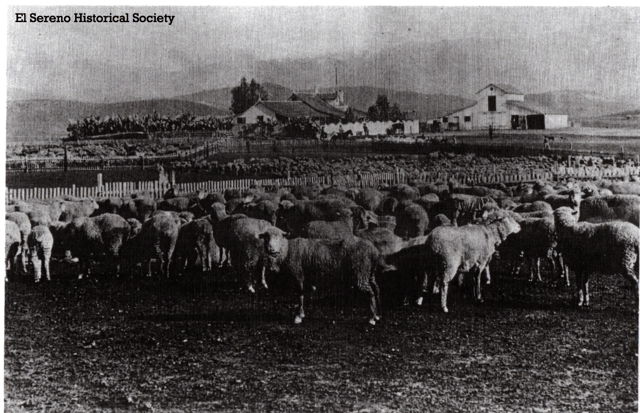
Flock of sheep with houses in background, Los Angeles County, about 1880, Photo taken on the Rancho Rosa de Castillo.
The university is located on the site of one of California's 36 original adobes, built in 1776 by Franciscan missionaries and destroyed by fire in 1908. When the Spanish Franciscans founded the San Gabriel Mission in 1771, they dubbed the small river El Rio Rosa de Castillo. These lands once were part of a Mexican land grant known as Rancho Rosa Castilla, given to Juan Batista Batz, a Basque rancher from northern Spain and his wife, Catalina who settled here in the 1852.[15][16][17][18] Batz used the land for farming and intensive sheep ranching. The inspiration for the name of the ranch, according to local historians, was the abundant amount of native wild Wood roses (Rosa californica) that grew near the ranch home along the creek. The Tongva Indians named this area, Ochuunga (Place of Roses).[19] The main drive through the campus is known as Paseo Rancho Castilla, in acknowledgment of the university's historic heritage.
Cal State LA was founded on July 2, 1947 by an act of the California legislature and opened for classes as Los Angeles State College (LASC) on the campus of Los Angeles City College (LACC). LACC is a public community college in East Hollywood, Los Angeles located on Vermont Avenue south of Santa Monica Boulevard the former campus of UCLA and originally a farm outside Los Angeles. As president of LACC, P. Victor Peterson became the acting president of the state college. Since the college had opened in September, 1947, with 136 students, it had grown in two years to over 2,000 students. Most were studying under the GI Bill, which had been largely responsible for establishment of the college. The first class of seven students graduated in 1948.
In 1949, when Howard S. McDonald became president of both Los Angeles State College and Los Angeles City College, the state college upper division classes were being taught in borrowed spaces on the City College campus by mostly part-time faculty. He hired administrators to help him formally organize the colleges. Then he found a site within LA[20] to house the new "Los Angeles State College of Applied Arts and Sciences," (LASCAAS) which replaced the Los Angeles State College also in 1949 after being reconstituted by the Legislature.[21][20] Howard S. McDonald enjoyed telling how some influential supporters of the University of Southern California (USC) opposed his selection of a piece of land in Baldwin Hills, and how the then Los Angeles Mayor Norris Poulson ran him out of Chavez Ravine so that he could lure the Dodger baseball team to Los Angeles. The college opened in its new location in 1958, Howard S. McDonald becomes first full-time president.[22] When McDonald retired in 1962, seven academic buildings on the new campus were completed and an eighth structure (North Hall, later named King Hall) was nearing completion. North Hall opened in September 1962.[20]
Second half of 20th century
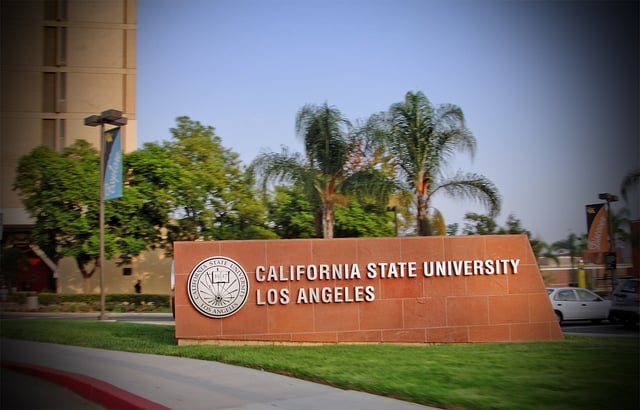
Entrance to the administration building.
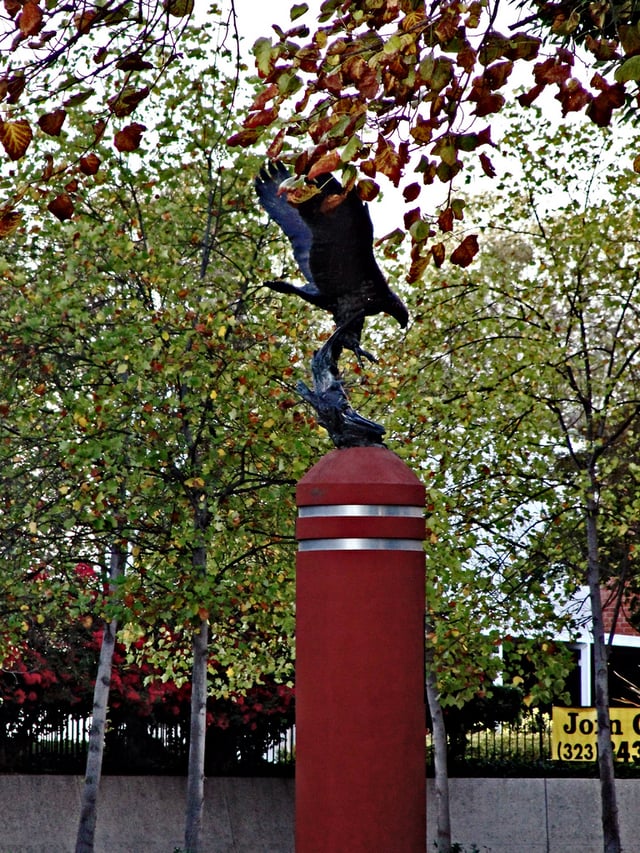
Bronze sculpture of Cal State LA's golden eagle mascot by Kenneth Bjorge.
In 1952 the state proposed a new satellite campus for Cal State LA, at the time known as Los Angeles State College, and in July 1958, the campus separated from Cal State LA and was renamed San Fernando Valley State College (now known as California State University, Northridge).[23][23] The first master’s degrees are awarded in 1952.
Since 1954, Cal State LA has been accredited by the Western Association of Schools and Colleges (WASC). The university's credential programs are approved by the Commission for Teacher Credentialing Committee on Accreditation.
In 1955, officials broke ground on the current location, dubbed the Ramona site at the time. The college then moved to its present campus in the northeastern section of the City of Los Angeles, 5 miles (8 km) east of the Civic Center.[24]
1957 the first Cal State LA time capsule is sealed in corner of Administration building (now Student Affairs) and a second Time capsule was buried during the Cal State LA 50th anniversary celebration September 1998.
In 1962 the college welcomed its third president Albert D. Graves who was vice president of Academic Affairs of LASCAAS. The college also entered into its first contract to prepare students for the U.S. Peace Corps. The first group of 65 volunteers was trained for service in the Dominican Republic in the areas of teacher training, music teacher training and urban community action. The first Commencement at new site takes place in June 1963.
On December 6, 1963 the California State College (now California State University) Board of Trustees named the library after the late 35th president of the United States John F. Kennedy. An edifice plaque was unveiled during the John F. Kennedy Memorial Library naming ceremony in February 12, 1964 and in November 1969 the library North Wing is dedicated.
In 1964, the Board of Trustees of the California State Colleges changed the name of the college to the "California State College at Los Angeles," (CSCLA) and in 1968 to "California State College, Los Angeles," when it became part of the California State College (CSC) system. In 1972, CSCLA was awarded university status and was renamed California State University, Los Angeles (CSULA).[25]
In 1968 Cal State LA established the nation's first Chicano Studies department.
In fall 1970 the South Tower and South Hall were completed and opened. July 1976 the CSU Board of Trustees approved the renaming of South Tower to Simpson Tower, in memory of Floyd R. Simpson, first dean, of the School of Business and Economics. South Hall renamed Salazar Hall in memory of slain Los Angeles Times journalist and news director for KMEX-DT Ruben Salazar.
The original mascot of the school was the Diablo. In 1980, new university president James Rosser adopted a new mascot, Eddie the golden eagle, designed to be more reflective of the campus' highly diverse community. The theme was extended to student facilities such as the student union and bookstore.[26]
A Statue of Confucius, a gift of the Republic of China in Taiwan, was dedicated June 1987. The statue was moved to a new campus location in summer 2005. Its home is now on the grassy area, south of the State Playhouse.
In 1993, the California State University (CSU) Chancellor and Trustees approved development of Cal State LA's Charter College of Education, creating the first such college of higher education in the nation.
In October 1998, the Center for Environmental Analysis (CEA-CREST), first of its kind funded by the National Science Foundation on the WestCoast, opened on campus.
21st century
In September 2000, California Governor Gray Davis chose the Cal State LA campus to hold press conference at which he signed the historic bills expanding the Cal Grant program.[27]
Cal State LA departments of Social Work and Nursing, located within the University’s College of Health and Human Services, were granted the status of School in Winter 2002.
Naming of the Rongxiang Xu College of Health and Human Services took place during the University's 69th Commencement on June 11, 2016. The naming recognized the largest gift in the University's history and named in honor of the late Dr. Rongxiang Xu, who was a surgeon and expert in regenerative medicine.
University presidents
| Presidents of Cal State LA | Years as president | |
|---|---|---|
| 1 | P. Victor Peterson | 1947–49 |
| 2 | Howard S. McDonald | 1949–62 |
| 3 | Albert D. Graves | 1962–63 |
| 4 | Franklyn A. Johnson | 1963–65 |
| 5 | John A. Greenlee | 1965–79 |
| 6 | James M. Rosser | 1979–2013 |
| 7 | William A. Covino[28] | 2013– |
Campus life and cost of university
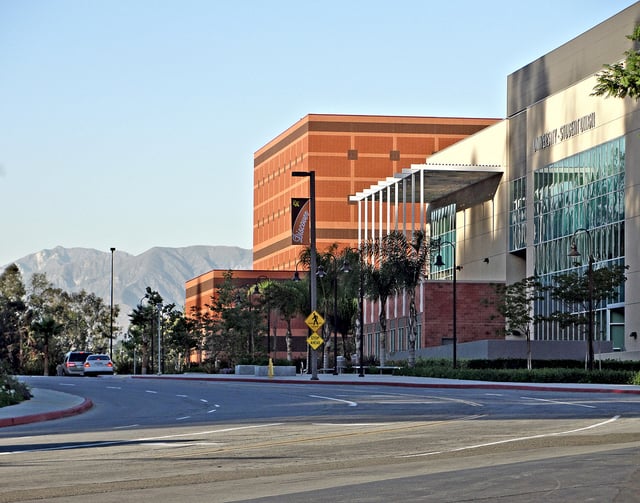
Cal State LA University-Student Union (U-SU) and Luckman Theatre.
| Undergrad | Graduate | California | U.S. Census | |
|---|---|---|---|---|
| Hispanic and Latino American | 67.7% | 46.4% | 38.6% | 17.7% |
| American Indian | 0.1% | 0.2% | 1.7% | 1.2% |
| White Non-Hispanic | 5.0% | 15.2% | 38.5% | 61.7% |
| Asian American Non-Hispanic | 12.9% | 13.1% | 14.4% | 5.5% |
| Pacific Islander | 0.1% | N/A | N/A | N/A |
| Black Non-Hispanic | 3.3% | 5.8% | 6.5% | 13.2% |
| Two or More Races Non-Hispanic | 1.5% | 2.2% | N/A | N/A |
| Non-resident alien | 7.2% | 12.3% | N/A | N/A |
| Unknown | 2.3% | 4.9% | N/A | N/A |
As of the fall of 2016, Cal State LA switched over from the quarter to the semester system. Tuition and fees for in-state is $6,745, $17,245 for out-of-state and room and board $11,723 as of the 2018-19 academic year with a student/faculty ratio of 25:1. Classes are scheduled Monday through Saturday from 7 am until 10 pm.
Near the edge of the city of Los Angeles, adjacent to the western San Gabriel Valley cities of Alhambra and Monterey Park, the campus affords views of the mountains to the north, the San Gabriel Valley to the east, metropolitan Los Angeles to the west, and the Palos Verdes Peninsula and Catalina Island to the south.
The Harriet and Charles Luckman Fine Arts Complex, the campus' northern gateway, was dedicated in 1994. An architectural tour-de-force, the buildings house a 1,100-seat theater, a fine art gallery and the black box Intimate Theater, completed in 2004.
Construction on a $30 million University-Student Union (U-SU) building has recently been completed. The facility offers a place for students and faculty to congregate and interact before or after class. It replaces the 1975 U-SU building that was closed down in 2004, due to seismic concerns. The U-SU, with a theater, a fitness center, and an array of other services dedicated to the student body. Its meeting rooms connect to those of The Golden Eagle via a third floor bridge. The Golden Eagle includes a food court, a Barnes & Noble operated bookstore and major conference facilities. The university food court is owned by the Coca-Cola Company, offering a selection of fast food chain restaurants that include El Pollo Loco, Carl's Jr., Rice Garden, Juice It Up, and Kikka Sushi. The U-SU facility houses additional selection of fast food that includes Sbarro and Starbucks. Various places inside the campus also serve food and coffee.
Cal State LA is one of only eight institutions in North and South America selected as a Rockefeller Foundation humanities fellowship residency site.[31]
As of fall 2018 Cal State LA has the second larges enrollment percentage of Mexican Americans and Other Latino Americans that are not Mexican-American in the Cal State University system.[32] Other Latinos Americans having heritage from Central America, South America and the Caribbean.
The HBO show Silicon Valley used the face of the U-SU as the building for the Hooli company.
Campus services
| |
|---|---|
| African American | 3.5% |
| Asian American | 10.0% |
| Filipino American | 3.0% |
| Pacific Islander | 0.1% |
| White European Americans | 6.4% |
| Native American/American Indian | 0.1% |
| Mexican American/Chicano | 50.3% |
| Other Latino American | 14.8% |
| Multiracial Americans | 1.6% |
| International students | 7.6% |
| Unknown | 2.7% |
| Female | 58.39% |
| Male | 41.61% |
California State University, Los Angeles offers a number of student services including nonremedial tutoring, a women's center, a job placement service, a day care, health services, and health insurance. Cal State LA also offers campus safety and police services like 24-hour foot and vehicle patrols, late night transport/escort service, 24-hour emergency telephones, lighted pathways/sidewalks, and student patrols.
Students, faculty, and staff can get a wireless connection to the Internet by interconnected Wi-Fi hot spots throughout the campus.
Associated Students
Associated Students Incorporated (ASI) is the student government of California State University, Los Angeles. ASI is governed by a student board of directors who is elected each year by the student body of Cal State LA ASI represents the interest of the student body and act as the officially recognized voice of the students. In addition, ASI sponsors a number of campus events and activities using mandatory student fees.[33]
Eagle Advocates a.k.a. Lobby Corps
Eagle Advocates, or ASI's Lobby Corps, is the sole student advocacy group representing the entire student body of the school. Each CSU campus has a lobby corps and is open to all students. Students are trained in advocacy and lobbying throughout the school year. A focus is aimed at the state legislature although local and federal issues are followed as well.[34]
Student housing
From 1964 to 1972, developer Louis Lesser built six off-campus, 10-story high-rise residential halls to house 3,600 students. The 175-acre (71 ha) campus lacked space for horizontal expansion, following the California State University expansion plan started in 1959. This doubled the university's housing capacity, making Cal State LA the largest in the California State University system. Maxwell Starkman & Associates, AIA, of Beverly Hills, designed the development plan. Unlike other components of the Cal State University system being developed in the 1960s, the residence halls were privately financed by Louis Lesser Enterprises, Inc. The first residential life complex phase I on-campus housing was opened in June 1984, and three years later, a second residential life complex Phase II was opened. Cal State LA has a student-housing complex where students can rent a house at double occupancy for $655.00 per month (as of November 2009). During 1984 Summer Olympics that took place in Los Angeles, Cal State LA student houses were upgraded and expanded because it housed the athletics of the 1984 Summer Olympics.[35][36]
The new housing expansion the Golden Eagle Apartments (GEA) for Graduate and Upper-Division Students are located one block north of campus.
Themed-living communities
Resident Scholars Housing The goal of Resident Scholars Housing is to provide Cal State LA Honors College and academically achieving students with themed housing that supports the mission and vision of the Honors College and the Institutional Learning Outcomes by forming a strong community of students through shared Honors classes, providing learning opportunities and social engagement beyond the classroom and engaging in a student-directed community. It also increases the following: student interaction with Honors faculty, staff and fellow students; involvement in the larger Los Angeles and Cal State LA community; and retention and graduation rates.
Gender Inclusive Housing Gender Inclusive Housing is for students interested in living with people of all gender identities and expressions. The Cal State LA Housing and Residence Life community defines Gender Inclusive Housing as an environment where students may choose to share a room with any other student regardless of sex, biological gender, gender identity, gender expression and sexual orientation.
Halisi Scholars Living Learning Community The Halisi Scholars Living Learning Community is designed to enhance the residential experience for students who are a part of or interested in issues regarding the Black community living on campus by offering the opportunity to connect with faculty and peers, and engage in programs that focus on academic success, cultural awareness and civic engagement. [38]
Parking and public transportation
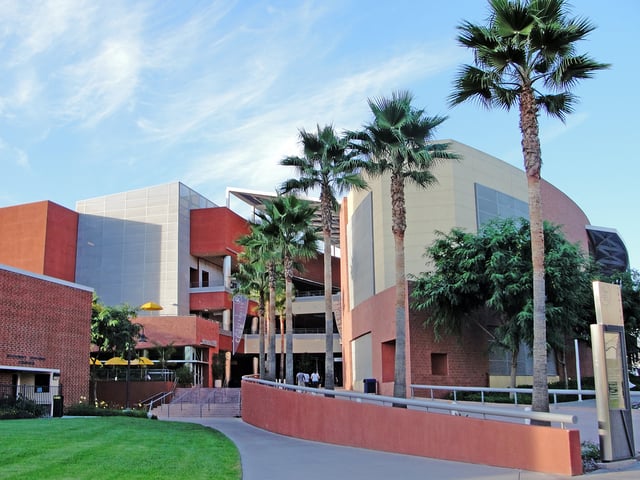
The Golden Eagle, consisting of two adjoining structures separated by a promenade.
Cal State LA's parking received press coverage for pioneering the concept of underground parking to deal with the limitations of ground space for expansion under the initial California State expansion plans of the early 1960s. Developer Louis Lesser developed "underground parking” in his off campus residential housing development for the university in 1964, with only a two level underground parking structure considered so unusual as to merit a separate newspaper section header, "Parking Underground", and calling the parking “subterranean spaces."[36]
The school is home to the first commuter train station on a college campus, the station of the same name on Metrolink's San Bernardino Line, which opened in October 1994. The school is also accessible from the namesake station on the El Monte Busway; both stations are located at the south end of the campus. Metro Local lines 665, 71, and 256, as well as neighborhood shuttles serve the school.
Construction is completed on a hydrogen fueling station on campus. The station will operate as a teaching resource for classes on alternative energy and fuel systems, as well as a public accommodation selling and dispensing hydrogen to those driving fuel cell vehicles. Cal State LA is one of only three organizations in the state to be awarded CARB funding for such a facility.[39]
Academics
| 2018 | 2017 | 2016 | 2015 | 2014 | 2013 | 2012 | 2011 | |
|---|---|---|---|---|---|---|---|---|
| Freshman applicants | 39,853 | 37,384 | 35,421 | 31,855 | 31,011 | 28,506 | 27,321 | 24,218 |
| Admits | 16,548 | 17,372 | 22,567 | 21,704 | 18,939 | 17,456 | 18,448 | 16,812 |
| % admitted | 41.5 | 46.5 | 63.7 | 68.1 | 61.1 | 61.2 | 67.5 | 69.4 |
| Enrolled | 3,862 | 3,556 | 3,830 | 3,862 | 3,234 | NDA | NDA | NDA |
| Yield Rate | 23.3% | 20.5% | 17.0% | 17.8% | 17.1% | NDA | NDA | NDA |
| GPA | 3.18[47] | NDA | NDA | NDA | NDA | 3.18 | 3.14 | 3.11 |
| SAT composite | 1060[47] | NDA | NDA | NDA | NDA | NDA | 880 | 880 |
| *SAT out of 1600 | ||||||||
The Charter College of Education's Division of Special Education and Counseling has a joint PhD program in Special Education with University of California, Los Angeles, and an independent EdD. program in Educational Administration as part of the Division of Applied and Advanced Studies in Education.
Cal State LA's School of Nursing launched the Doctor of Nursing Practice (DNP) in the fall of 2012. The DNP has been accredited by the Western Association of Schools and Colleges (WASC).
Cal State LA's Small Business Strong team of undergraduates students was the winner of the 2016 LA Mayor's Cup. The Mayor's Cup is a competition for young entrepreneurs at L.A. universities to pitch innovative solutions for tackling the city’s biggest challenges. More than 100 teams applied. The Cal State LA team and four other finalists pitched their projects to L.A. Mayor Eric Garcetti, deputy mayors, and local business leaders.[50][51][52]
Cal State LA's College of Business and Economics (CB&E) is divided into six departments: Accounting, Economics & Statistics, Finance Law & Real Estate, Information Systems, Management and Marketing. CB&E is accredited by the Association to Advance Collegiate Schools of Business (AACSB International).
In July 2000 the university's Model United Nations (NMUN) chapter placed in the top 30 out of 190 teams in the New York City competition, bringing home its first national conference win since the chapter's inception more than 30 years previous. The Cal State LA student delegation garnered top awards in all categories at the 2009 annual National Model United Nations. In 2010 The student team received both "Outstanding Delegation" and "Outstanding Position Papers," the highest honors a delegation can receive.[31]
With the nation's first Chicano Studies department (established in 1968), Cal State LA is a top source of bachelor's and master's degrees for Hispanic students in California.[31]
Cal State LA's academic departments and programs are organized into eight colleges:
College of Arts and Letters
College of Business and Economics
The Charter College of Education
College of Engineering, Computer Science, and Technology
Rongxiang Xu College of Health and Human Services
College of Natural and Social Sciences
College of Professional and Global Education
Honors College
Desert Studies Center
The Desert Studies Center is a field station of the California State University located in Zzyzx, California in the Mojave Desert. The purpose of the Center is to provide opportunities to conduct research, receive instruction and experience the Mojave Desert environment. Is officially operated by the California Desert Studies Consortium, a consortium of 7 CSU campuses: Fullerton, Cal Poly Pomona, Long Beach, San Bernardino, Northridge, Dominguez Hills and Los Angeles.[53]
Faculty
Cal State Los Angeles' faculty include two presidential award-winning professors and 13 faculty members honored with the CSU Trustees' Outstanding Professor Awards.[54]
Professors
In December 1999 Raymond Landis, Dean of Engineering and Technology, was honored by the White House for outstanding student mentoring. The recognition earned the university its second presidential award.[55]
In September 1996 chemistry professor Carlos G. Gutiérrez was among the first honorees named by President Bill Clinton to receive the newly established annual Presidential Award for Excellence in Science, Mathematics and Engineering Mentoring, at a White House ceremony.[56]
In Fall 1995 chemistry professor Thomas P. Onak, was named California Professor of the Year by the Carnegie Foundation for the Advancement of Teaching and the Council for Advancement and Support of Education.[57]
In 1992 chemistry professor Phoebe K. Dea, was named California Professor of the Year by the Carnegie Foundation for the Advancement of Teaching and the Council for Advancement and Support of Education.[58]
Hal Fishman served as an assistant adjunct professor of political science for two years. Fishman won the Associated Press Television-Radio Association's first-ever Lifetime Achievement Award for his work as a Los Angeles local (KTLA) news anchor.[59]
Ann Garry – Professor Emerita of Philosophy; early pioneer of the field of feminist philosophy.
Distinguished Visiting Adjunct Professors
Christopher Isherwood taught a course on Modern English Literature in 1961-1962. A noted author his Berlin Stories was the basis for the Broadway musical and film, Cabaret.[60]
Dorothy Parker taught a course in the English department in 1962–63. Parker, a writer and founding member of the Algonquin Round Table was inducted into the American Academy of Arts and Letters in 1959.[61][62]
Trustee Professors
Barry Munitz – 5th chancellor of the California State University system, and 6th president of the University of Houston[63]
